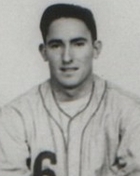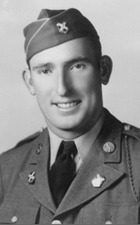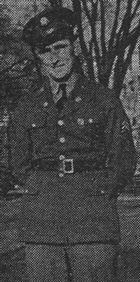Elmer Wright
| Date and Place of Birth: | October 11, 1915 Bedford, VA |
| Date and Place of Death: | June 6, 1944 Omaha Beach, Normandy, France |
| Baseball Experience: | Minor League |
| Position: | Pitcher |
| Rank: | Staff Sergeant |
| Military Unit: | Company A, 116th Infantry Regiment, 29th Infantry Division US Army |
| Area Served: | European Theater of Operations |
Elmer Wright was a great minor league pitcher who swapped his flannels for military fatigues. He trained for 22 months to be an infantryman. He survived only a few minutes in combat.
During the Great Depression, Bedford, Virginia, was a tight knit
community of about 3,000, and Elmere P. "Elmer" Wright was the son of
the town's deputy sheriff, Howard P. Wright. Elmer was a standout
athlete at Bedford High School, a tackle in football and a hard throwing
pitcher on the baseball team. After graduating from high school, the
funloving right-hander pitched for a number of local semi-pro teams and,
like many youngsters, he also joined Company A of the local National
Guard, if for no other reason than it paid a couple of dollars at a time
when money was hard to come by.
In the spring of 1937, Wright, age 21, attended the Ray L. Doan baseball
school at Hot Springs, Arkansas. From there he was signed by the St.
Louis Browns and assigned to the Terre Haute Tots of the Class B Three-I
League. He struck out 90 batters in the 74 innings he threw for the Tots
but could not win a game. After running his won-loss record to 0-7, he
was assigned to the Mayfield Clothiers of the Class D Kitty League,
where he was 7-7 with a 3.65 ERA and struck out 122 in 116 innings.
Wright pitched the last three innings of the Kitty League all-star game
in July (a 5-2 win over the Jackson Generals), and helped the Clothiers
to a fourth-place tie with Jackson. They then defeated Jackson in a
one-game playoff to secure fourth place and a playoff berth. The
Clothiers went on to defeat Union City in three games and take the
playoff title in five games over the Fulton Eagles.
Wright was with the Johnstown Johnnies of the Class C Middle-Atlantic
League for 1938. He made 30 appearances for a 6-14 record and two of
those victories occurred on the same day. He beat Dayton, 4-1, in the
opening game of a June 30 doubleheader, then pitched the first four
innings of the second game to take the victory in an 11-3 win. Wright
had shown enough to be called to the Class Al Texas League San Antonio
Missions' spring training camp in Brownsville, Texas, for 1939, but was
assigned to the Jackson Senators of the Class B Southeastern League for
the regular season, where he pitched 32 games for a 7-11 record and 5.45
ERA. He was back with the Missions for spring training in 1940, but was
a late cut, being sent to Meridian of the Class B Southeastern League.
However, Wright did not report and sat out the season.
As the war in Europe took hold during 1940, the United States began to
expand its fighting forces. In October, it was announced that Bedford's
National Guard Company A would be mobilized into the federal Army for a
period of one year, and on February 3, 1941, Wright and the other
members of Company A reported to the Bedford Armory. They were sent to
Fort Meade, Maryland, home of the 29th Infantry Division, and during the
summer of 1941, Wright regularly had the opportunity to pitch for the
Fort Meade post team. While at Fort Meade, news was received of the
Japanese attack on Pearl Harbor. It ended all hope of being home in a
year.
In August 1942, Company A, as part of the 116th Infantry Regiment, 29th
Infantry Division, left Fort Meade bound for Camp Blanding in Florida.
Less than a month later they boarded a train that took them to Camp
Kilmer, New Jersey, staging post to Britain. A staggering total of
11,000 troops boarded the Queen Mary for the Atlantic crossing with an
escort of five destroyers and a British cruiser, HMS Curacao. As the
Queen Mary approached Scotland, the Curacao guided her to the Forth of
Clyde. It was a routine operation but at 12:12 P.M. on October 2, 1942,
disaster struck. The Queen Mary collided with the Curacao. The huge
ocean liner suffered minimal damage but the Curacao sank almost
immediately and the lives of 338 British sailors were lost.
Shaken, but safely on dry land in Scotland, the division moved by train
to London, England, and from there to Tidworth Barracks just ten miles
from historic Stonehenge. It was the beginning of the division's
training program that would last until May 1944, the longest of any
American infantrymen in World War II. Elmer Wright still found a little
time for baseball in England. In September 1943, he played for the 116th
Infantry Regiment Yankees in a four-day U.S. services baseball
tournament in London. The Yankees were a dark horse team at the outset
of the tournament - unknown to most of the other teams who were already
playing in well-established military leagues around Britain. Wright,
together with outfielder Frank Draper and catcher Tony Marsico (who were
also from Bedford, Virginia) were the backbone of the team. Draper had
grown up desperately poor on the wrong side of the tracks in Bedford. A
superb, naturally-gifted athlete, he had been the lead-off hitter with
the semi-pro Hampton Looms mill team before military service. Marsico
was 34 years old and a talented catcher who had played for the Piedmont
Label team. [1] Wright's pitching guided the Yankees to an unexpected
place in the final against Eighth Air Force Fighter Command. He started
the game for the Yankees and yielded four hits and a run over four
innings before giving way to former Penn State Association pitcher Doug
Gillette. The Yankees won the game, 6-3, for the European Theater
championship title (Draper had three hits that day, including two
triples). That was to be Wright's last chance to play any form of
competitive baseball. For the remainder of 1943 and the first five
months of 1944, it was intensive military training in preparation for
the invasion of mainland Europe.
Professional baseball back home had not forgotten about Elmer Wright,
however. In June 1943, he received an unexpected letter from the Toledo
Mud Hens, the club to whom he had been assigned shortly before entering
military service. "I just wanted to write you this note," penned Mud
Hens president G. E. Gilliland, "and let you know that I am mighty proud
of the fact that you are serving our country and to wish you the best of
luck. You boys over there are certainly doing a grand job.... After
throwing hand grenades at those Japs and Germans, your control should be
perfect and that is all that you ever needed to win anywhere so hurry up
and get this thing over with and get back over here because I could use
a good pitcher right now." [2]
Wright also found time to keep in touch with his parent club. A reply
from Browns' vice-president, William O DeWitt, dated March 16, 1944,
read:
Dear Elmere:
We have your very interesting letter of recent date and assure you it
was a pleasure to hear from you and to know something about you.
You certainly have spent quite a long stretch in the Army and if the
newspaper stories are correct, perhaps you will get a chance to return
to this country in the not too distant future.
We are mighty glad that you played some baseball and that you won the
Championship. Your record was certainly impressive: In fact, by not
losing any your record was perfect. I am glad to know that your
curveball and your control are better, even though your fastball is not
as good as it used to be. I think you will be a much better pitcher and
I know you will be ready for some high class baseball when you get back.
The Browns and Toledo begin spring training together at Cape Girardeau,
Missouri on Monday, March 20, with the American League season opening on
April 18 and the American Association on April 19.
The envelope in which your letter was sent to us is different from any
other envelopes we have received from overseas. Can you tell us the
reason your outfit uses this kind of envelope, or is that a military
secret? Can you tell us where you are stationed?
Thanking you for your letter and with continued good wishes, we are,
Sincerely yours,
William O DeWitt
Vice-President [3]
On May 18, 1944, the 116th Infantry Regiment of the 29th Infantry
Division were taken in trucks to containment camps on the south-east
coast of England. The countdown to D-Day had begun and Wright's military
skills were soon to be tested. Movement outside the camps was strictly
forbidden as absolute secrecy regarding invasion details was essential
and it was a boring and anxious couple of weeks for the men of Company
A. "Whenever we had time, I put on a glove and [Elmer Wright] pitched to
me," recalls former college catcher, Hal Baumgarten in Alex Kershaw's
The Bedford Boys. "Wright was fast. I had to put a double sponge in the
glove." [4]
On the morning of June 6, 1944, Staff Sergeant Wright was on a
landing craft heading for Omaha Beach at Normandy. Company A of the
116th Infantry Regiment was to lead the D-Day assault. As the landing
crafts approached the beach the enemy opened fire with artillery,
mortar, machine-gun and small arms fire. Frank Draper, the outfielder
from Bedford, was on another landing craft. The Army had been the making
of the 25 year-old. He was resourceful, calm and decisive under
pressure, yet totally unprepared for what was about to happen. Draper's
craft violently shook with the horrifying impact of an anti-personnel
shell that ripped through the metal side and tore off his upper arm.
Rapidly losing blood, the young soldier slumped to the floor and died in
a pool of blood, seawater and vomit.
Wright's landing craft made it to the beach and as the ramp dropped the
men were met with a hail of enemy fire. Most were killed outright.
Others lay critically wounded, screaming for help. Those that could,
jumped in to the six-foot of water and desperately tried to make their
way to the beach. Wright was killed in the hail of gunfire almost as
soon as he hit the beach.
It was not until July 16 that news of the horrendous losses suffered
by Company A reached the townsfolk of Bedford. Nineteen local boys died
in the first bloody minutes at Normandy. Two more died later in the day.
No other town in America suffered a greater loss.
Elmer
Wright is buried at the Normandy American Cemetery at
Colleville-sur-Mer in France.
|
Year |
Team |
League |
Class |
G |
IP |
ER |
BB |
SO |
W |
L |
ERA |
| 1937 | Terre Haute | Three-I | B | 16 | 74 | - | 48 | 90 | 0 | 7 | - |
| 1937 | Mayfield | Kitty | D | 21 | 116 | 47 | 64 | 122 | 7 | 7 | 3.65 |
| 1938 | Johnstown | Mid-Atlantic | C | 30 | 120 | 80 | 74 | 83 | 6 | 14 | 6.00 |
| 1939 | Jackson | Southeastern | B | 32 | 165 | 100 | 101 | 89 | 7 | 11 | 5.45 |
| 1940 | Meridian | Southeastern | B | - | - | - | - | - | - | - | - |
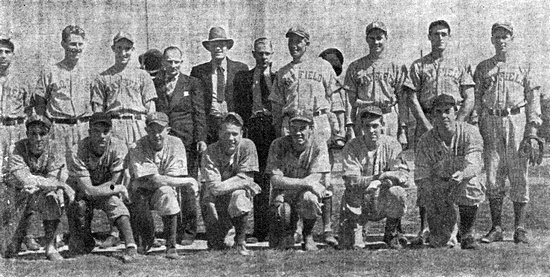
The 1937 Mayfield Clothiers.
(Elmer Wright is standing, third from left)
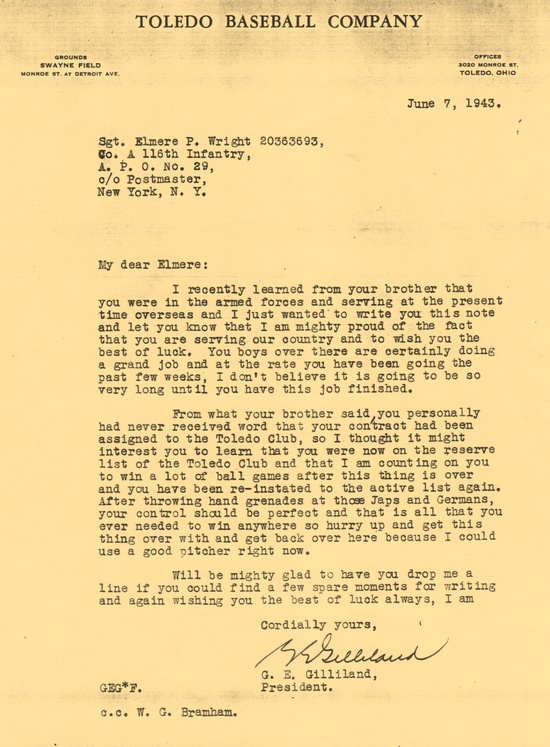
letter to Elmer Wright from G.E. Gilliland, president of the Toledo Mud Hens
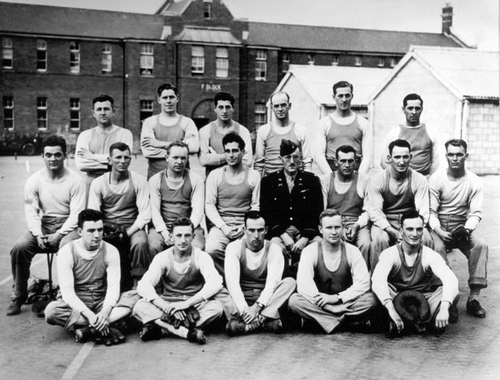
The 116th Infantry Regiment Yankees in England in
1943
(Elmer Wright is middle row, second from right)
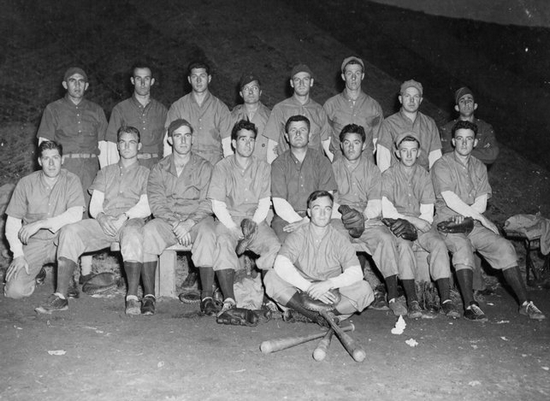
The 116th Infantry Regiment Yankees in England in
1943 after winning the ETO World Series
(Elmer Wright is front row, third from left)
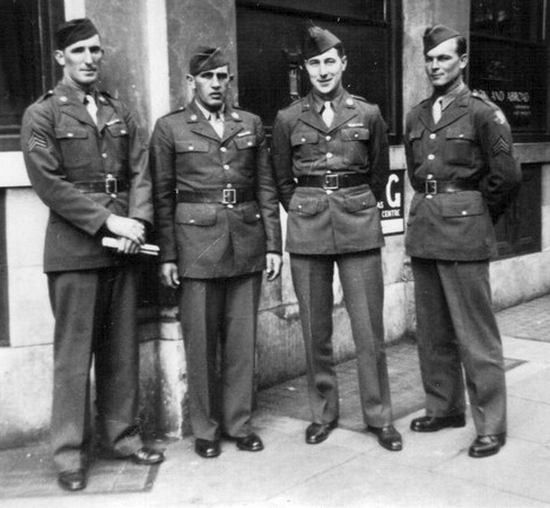
Elmer Wright (left) with Robert Marsico, Pride Wingfield and Frank Draper
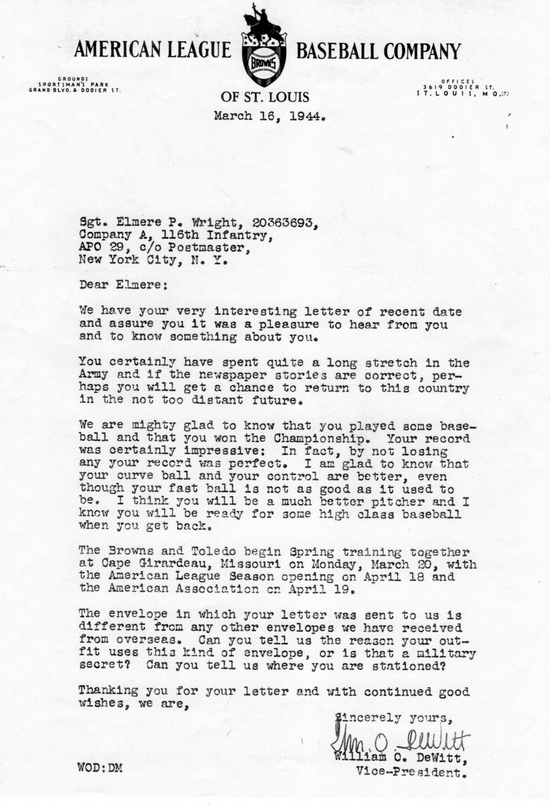
Letter to Elmer Wright from William O. DeWitt, vice-president of the St. Louis Browns
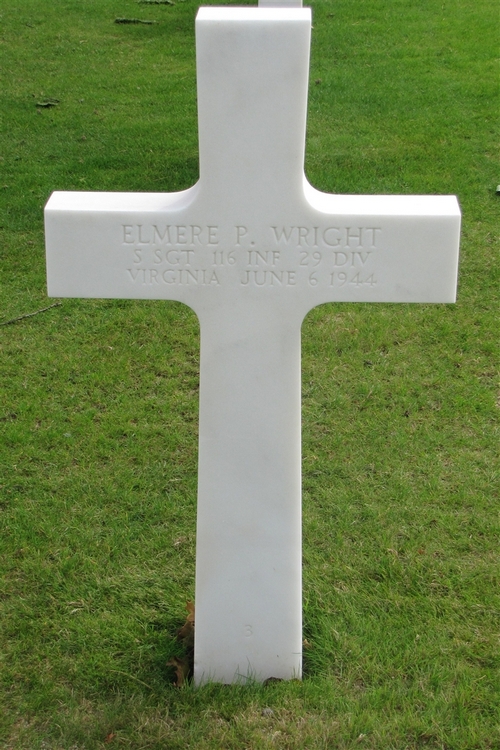
The grave of Elmer Wright at the Normandy American Cemetery at Colleville-sur-Mer in France.
Notes
1. Catcher Robert Marsico suffered injuries to his right arm and leg
at Omaha Beach. He was hospitalized in England for three months and
spent the next year at a rehabilitation center in Norfolk, Virginia,
before being discharged in July 1945. Due to his injuries, Marsico's
ball-playing days were over. He returned to work with the Piedmont Label
Company, where he remained for 41 years and became an accomplished
golfer winning several club tournaments. Robert Marsico passed away in
August 1986, at the age of 77.
2. Letter from G. E. Gilliland, President, Toledo Baseball Company to
Sergeant Elmere P. Wright, dated June 7, 1943.
3. Letter from William O. DeWitt, Vice-President, St. Louis Browns to
Sergeant Elmere P. Wright, dated March 16, 1944.
4. Kershaw, Alex. The Bedford Boys: One American Town's Ultimate D-day
Sacrifice (DaCapo Press, 2004)
Date Added May 31, 2012 Updated June 13, 2014
Baseball's Greatest Sacrifice is associated with Baseball Almanac
Baseball's Greatest Sacrifice is proud to be sponsored by

